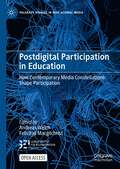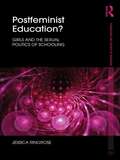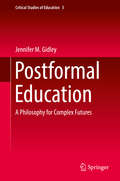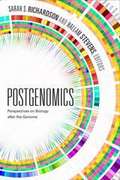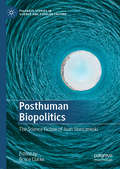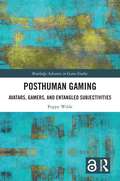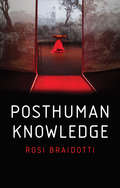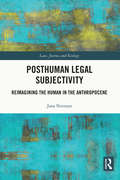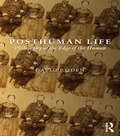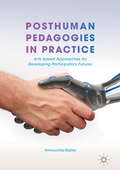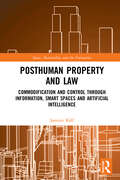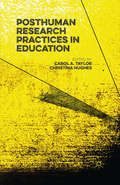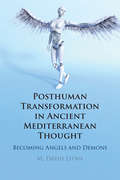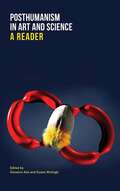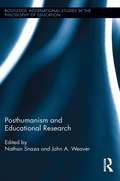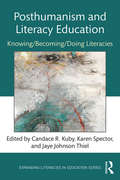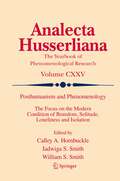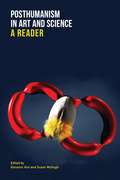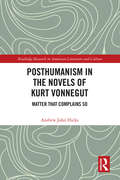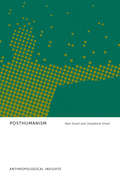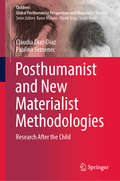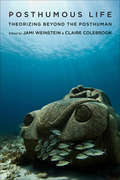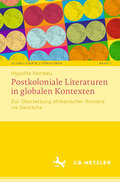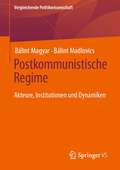- Table View
- List View
Postdigital Participation in Education: How Contemporary Media Constellations Shape Participation (Palgrave Studies in Educational Media)
by Andreas Weich Felicitas MacgilchristThis open access book examines the interrelations and correlations of the postdigital condition and its relationship to education, with a particular focus on participation. Contributions reflect on how educational institutions are affected by the recent transformations of media technologies and practices, and how at the same time institutions such as schools and universities are supposed to enable people to participate in media practices in an informed and reflective way. How, and under what conditions, can teachers and students participate in contemporary media constellations? The book will be of interest to academics and researchers involved in teacher education, digital pedagogy, educational technology, instructional design, education philosophy and media education.
Postfeminist Education?: Girls and the Sexual Politics of Schooling (Foundations and Futures of Education)
by Jessica RingroseThis book challenges a contemporary postfeminist sensibility grounded not only in assumptions that gender and sexual equality has been achieved in many Western contexts, but that feminism has gone ‘too far’ with women and girls now overtaking men and boys - positioned as the new victims of gender transformations. The book is the first to outline and critique how educational discourses have directly fed into postfeminist anxieties, exploring three postfeminist panics over girls and girlhood that circulate widely in the international media and popular culture. First it explores how a masculinity crisis over failing boys in school has spawned a backlash discourse about overly successful girls; second it looks at how widespread anxieties over girls becoming excessively mean and/or violent have positioned female aggression as pathological; third it examines how incessant concerns over controlling risky female sexuality underpin recent sexualisation of girls' moral panics. The book outlines how these postfeminist panics over girlhood have influenced educational policies and practices in areas such as academic achievement, anti-bullying strategies and sex-education curriculum, making visible the new postfeminist, sexual politics of schooling. Moving beyond media or policy critique, however, this book offers new theoretical and methodological tools for researching postfeminism, girlhood and education. It engages with current theoretical debates over possibilities for girls’ agency and empowerment in postfeminist, neo-liberal contexts of sexual regulation. It also elaborates new psychosocial and feminist Deleuzian methodological approaches for mapping subjectivity, affectivity and social change. Drawing on two UK empirical research projects exploring teen-aged girls’ own perspectives and responses to postfeminist panics, the book shows how real girls are actually negotiating notions of girls as overly successful, mean, violent, aggressive and sexual. The data offers rich insight into girls’ gendered, raced and classed experiences at school and beyond, exploring teen peer cultures, friendship, offline and online sexual identities, and bullying and cyberbullying. The analysis illuminates how and when girls take up and identify with postfeminist trends, but also at times attempt to re-work, challenge and critique the contradictory discourses of girlhood and femininity. In this sense the book offers an opportunity for girls to ‘talk back’ to the often simplistic either wildly celebratory or crisis-based sensationalism of postfeminist panics over girlhood. This book will be essential reading for those interested in feminism, girlhood, media studies, gender and education.
Postformal Education
by Jennifer M. GidleyThis book explains why the current education model, which was developed in the 19th century to meet the needs of industrial expansion, is obsolete. It points to the need for a new approach to education designed to prepare young people for global uncertainty, accelerating change and unprecedented complexity. The book offers a new educational philosophy to awaken the creative, big-picture and long-term thinking that will help equip students to face tomorrow's challenges. Inside, readers will find a dialogue between adult developmental psychology research on higher stages of reasoning and today's most evolved education research and practice. This dialogue reveals surprising links between play and wisdom, imagination and ecology, holism and love. The overwhelming issues of global climate crisis, growing economic disparity and the youth mental health epidemic reveal how dramatically the current education model has failed students and educators. This book raises a planet-wide call to deeply question how we actually think and how we must educate. It articulates a postformal education philosophy as a foundation for educational futures. The book will appeal to educators, educational philosophers, pre-service teacher educators, educational and developmental psychologists and educational researchers, including postgraduates with an interest in transformational educational theories designed for the complexity of the 21st century. This is the most compelling book on education I have read for many years. It has major implications for all who are in a position to influence developments in teacher education and educational policy. Gidley is one of the very rare scholars who can write intelligently and accessibly about the past, present and future in education. I was challenged and ultimately convinced by her contention that 'what masquerades as education today must be seen for what it is - an anachronistic relic of the industrial past'. Gidley's challenge is to 'co-evolve' a radically new education. All who seek to play a part must read this book. Brian J. Caldwell, PhD, Educational Transformations, former Dean of Education at the University of Melbourne and Deputy Chair, Australian Curriculum, Assessment and Reporting Authority (ACARA)
Postgenomics: Perspectives on Biology after the Genome
by Hallam Stevens Sarah S. RichardsonTen years after the Human Genome Project's completion the life sciences stand in a moment of uncertainty, transition, and contestation. The postgenomic era has seen rapid shifts in research methodology, funding, scientific labor, and disciplinary structures. Postgenomics is transforming our understanding of disease and health, our environment, and the categories of race, class, and gender. At the same time, the gene retains its centrality and power in biological and popular discourse. The contributors to Postgenomics analyze these ruptures and continuities and place them in historical, social, and political context. Postgenomics, they argue, forces a rethinking of the genome itself, and opens new territory for conversations between the social sciences, humanities, and life sciences.Contributors. Russ Altman, Rachel A. Ankeny, Catherine Bliss, John Dupré, Michael Fortun, Evelyn Fox Keller, Sabina Leonelli, Adrian Mackenzie, Margot Moinester, Aaron Panofsky, Sarah S. Richardson, Sara Shostak, Hallam Stevens
Posthuman Biopolitics: The Science Fiction of Joan Slonczewski (Palgrave Studies in Science and Popular Culture)
by Bruce ClarkeThis volume presents the first collection of essays dedicated to the science fiction of microbiologist Joan Slonczewski. Posthuman Biopolitics consolidates the scholarly literature on Slonczewski’s fiction and demonstrates fruitful lines of engagement for the critical, cultural, and theoretical treatment of her characters, plots, and storyworlds. Her novels treat feminism in relation to scientific practice, resistance to domination, pacifism versus militarism, the extension of human rights to nonhuman and posthuman actors, biopolitics and posthuman ethics, and symbiosis and communication across planetary scales. Posthuman Biopolitics explores the breadth and depth of Joan Slonczewski’s vision, uncovering the reflective ethical practice that informs her science fiction.
Posthuman Gaming: Avatars, Gamers, and Entangled Subjectivities (Routledge Advances in Game Studies)
by Poppy WildePosthuman Gaming: Avatars, Gamers, and Entangled Subjectivities explores the relationship between avatar and gamer in the massively multiplayer online roleplaying game World of Warcraft, to examine notions of entangled subjectivity, affects and embodiments – what it means and how it feels to be posthuman. With a focus on posthuman subjectivity, Wilde considers how we can begin to articulate ourselves when the boundary between self and other is unclear. Drawing on fieldnotes of her own gameplay experiences, the author analyses how subjectivity is formed in ways that defy a single individual notion of "self", and explores how different practices, feelings, and societal understandings can disrupt strict binaries and emphasise our posthumanism. She interrogates if one can speak of an "I" in the face of posthuman multiplicity, before exploring different analytical themes, beginning with how acting theories might be posthumanised and articulate the relationship between avatar and gamer. She then defines posthuman empathy and explains how this is experienced in gaming, before addressing the need to account for boredom, the complexity of nostalgia, and ways death and loss are experienced through gaming. This volume will appeal to a broad audience and is particularly relevant to scholars and students of cultural studies, media studies, humanities, and game studies. Chapters 2 and 7 of this book are freely available as a downloadable Open Access PDF at http://www.taylorfrancis.com under a Creative Commons Attribution-Non Commercial-No Derivatives (CC-BY-NC-ND) 4.0 license.
Posthuman Knowledge
by Rosi BraidottiThe question of what defines the human, and of what is human about the humanities, have been shaken up by the radical critiques of humanism and the displacement of anthropomorphism that have gained currency in recent years, propelled in part by rapid advances in our knowledge of living systems and of their genetic and algorithmic codes coupled with the global expansion of a knowledge-intensive capitalism. In Posthuman Knowledge, Rosi Braidotti takes a closer look at the impact of these developments on three major areas: the constitution of our subjectivity, the general production of knowledge and the practice of the academic humanities. Drawing on feminist, postcolonial and anti-racist theory, she argues that the human was never a neutral category but one always linked to power and privilege. Hence we must move beyond the old dualities in which Man defined himself, beyond the sexualized and racialized others that were excluded from humanity. Posthuman knowledge, as Braidotti understands it, is not so much an alternative form of knowledge as a critical call: a call to build a multi-layered and multi-directional project that displaces anthropocentrism while pursuing the analysis of the discriminatory and violent aspects of human activity and interaction wherever they occur.Situated between the exhilaration of scientific and technological advances on the one hand and the threat of climate change devastation on the other, the posthuman convergence encourages us to think hard and creatively about what we are in the process of becoming.
Posthuman Legal Subjectivity: Reimagining the Human in the Anthropocene (Law, Justice and Ecology)
by Jana NormanThis book provides a reimagining of how Western law and legal theory structures the human–earth relationship. As a complement to contemporary efforts to establish rights of nature and non-human legal personhood, this book focuses on the other subject in the human–earth relationship: the human. Critical ecological feminism exposes the dualistic nature of the ideal human legal subject as a key driver in the dynamic of instrumentalism that characterises the human–earth relationship in Western culture. This book draws on conceptual fields associated with the new sciences, including new materialism, posthuman critical theory and Big History, to demonstrate that the naturalised hierarchy of humans over nature in the Western social imaginary is anything but natural. It then sets about constructing a counternarrative. The proposed ‘Cosmic Person’ as alternative, non-dualised human legal subject forges a pathway for transforming the Western cultural understanding of the human–earth relationship from mastery and control to ideal co-habitation. Finally, the book details a case study, highlighting the practical application of the proposed reconceptualisation of the human legal subject to contemporary environmental issues. This original and important analysis of the legal status of the human in the Anthropocene will be of great interest to those working in legal theory, jurisprudence, environmental law and the environmental humanities; as well as those with relevant interests in gender studies, cultural studies, feminist theory, critical theory and philosophy.
Posthuman Life: Philosophy at the Edge of the Human
by David RodenWe imagine posthumans as humans made superhumanly intelligent or resilient by future advances in nanotechnology, biotechnology, information technology and cognitive science. Many argue that these enhanced people might live better lives; others fear that tinkering with our nature will undermine our sense of our own humanity. Whoever is right, it is assumed that our technological successor will be an upgraded or degraded version of us: Human 2.0.Posthuman Life argues that the enhancement debate projects a human face onto an empty screen. We do not know what will happen and, not being posthuman, cannot anticipate how posthumans will assess the world. If a posthuman future will not necessarily be informed by our kind of subjectivity or morality the limits of our current knowledge must inform any ethical or political assessment of that future. Posthuman Life develops a critical metaphysics of posthuman succession and argues that only a truly speculative posthumanism can support an ethics that meets the challenge of the transformative potential of technology.
Posthuman Pedagogies in Practice: Arts based Approaches for Developing Participatory Futures
by Annouchka BayleyThis book investigates transdisciplinary, arts-based approaches to developing innovative and pertinent higher education pedagogy. Introducing timely critical thinking strategies, the author addresses some of the key issues facing educators today in an increasingly complex digital, technological and ecological world. The author combines emerging ideas in the New Materialism and Posthumanism schools of thought with arts-based teaching and learning, including Practice-as-Research, for Social Science contexts, thus exploring how this approach can be used to productively create new pedagogical strategies. Drawing on a rich repertoire of real-life examples, the volume suggests transferrable routes into practice that are suitable for lecturers, researchers and students. This practical and innovative volume will appeal to researchers and practitioners interested in Posthuman and New Materialist theories, and how these can be applied to the educational landscape in future.
Posthuman Property and Law: Commodification and Control through Information, Smart Spaces and Artificial Intelligence
by Jannice KällThis book analyses the phenomenon of digitally mediated property and considers how it problematises the boundary between human and nonhuman actors. The book addresses the increasingly porous border between personhood and property in digitized settings and considers how the increased commodification of knowledge makes visible a rupture in the liberal concept of the property owning, free, person. Engaging with the latest work in posthumanist and new materialist theory, it shows, how property as a concept as well as a means for control, changes fundamentally under advanced capitalism. Such change is exemplified by the way in which data, as an object of commodification, is extracted from human activities yet is also directly used to affectively control – or nudge – humans. Taking up a range of human engagements with digital platforms and coded architectures, as well as the circulation of affects through practices of artificial intelligence that are employed to shape behaviour, the book argues that property now needs to be understood according to an ecology of human as well as nonhuman actors. The idea of posthuman property, then, offers both a means to critique property control through digital technologies, as well as to move beyond the notion of the self-owning, object-owning, human. Engaging the most challenging contemporary technological developments, this book will appeal to researchers in the areas of Law and Technology, Legal Theory, Intellectual Property Law, Legal Philosophy, Sociology of Law, Sociology, and Media Studies.
Posthuman Research Practices in Education
by Carol A. Taylor Christina HughesHow do we include and develop understandings of those beyond-the-human aspects of the world in social research? Through fifteen contributions from leading international thinkers, this book provides original approaches to posthumanist research practices in education. It responds to questions which consider the effect and reach of posthuman research.
Posthuman Research Practices in Education
by Carol A. Taylor Christina HughesHow do we include and develop understandings of those beyond-the-human aspects of the world in social research? Through fifteen contributions from leading international thinkers, this book provides original approaches to posthumanist research practices in education. It responds to questions which consider the effect and reach of posthuman research.
Posthuman Transformation in Ancient Mediterranean Thought: Becoming Angels and Demons
by M. David LitwaThere is not just a desire but a profound human need for enhancement - the irrepressible yearning to become better than ourselves. Today, enhancement is often conceived of in terms of biotechnical intervention: genetic modification, prostheses, implants, drug therapy - even mind uploading. The theme of this book is an ancient form of enhancement: a physical upgrade that involves ethical practices of self-realization. It has been called 'angelification' - a transformation by which people become angels. The parallel process is 'daimonification', or becoming daimones. Ranging in time from Hesiod and Empedocles through Plato and Origen to Plotinus and Christian gnostics, this book explores not only how these two forms of posthuman transformation are related, but also how they connect and chasten modern visions of transhumanist enhancement which generally lack a robust account of moral improvement.
Posthumanism In Art And Science: A Reader
by Giovanni Aloi Susan McHughPosthumanism synthesizes philosophical, literary, and artistic responses to technological advancements, globalization, and mass extinction in the Anthropocene. It asks what it can mean to be human in an increasingly more-than-human world that has lost faith in the ideal of humanism, the autonomous, rational subject, and it models generative alternatives cognizant of the demands of social and ecological justice. Amid rising social justice movements, collapsing economic structures, and the dwindling power of cultural institutions, posthumanism advances thinking on new and previously unenvisionable challenges. Posthumanism in Art and Science is an anthology of indispensable statements and artworks that provide an unprecedented mapping of this intellectual and aesthetic development in a global context. It features groundbreaking theorists including Donna Haraway, Rosi Braidotti, Mel Y. Chen, Michael Marder, Alexander Weheliye, Anna Tsing, Timothy Morton, N. Katherine Hayles, Bruno Latour, Francesca Ferrando, and Cary Wolfe, as well as innovative, influential artists and curators such as Yvonne Rainer, Skawennati, Chus Martínez, William Wegman, Nandipha Mntambo, Cassils, Pauline Oliveros, and Doo-sung Yoo. These provocative and compelling works, including previously unpublished interviews and essays, speak to the ongoing conceptual and political challenge of posthumanist thinking in a time of unprecedented cultural and environmental crises. An essential primer and reference for educators, students, artists, and art enthusiasts, this volume offers a powerful framework for rethinking anthropocentric certitudes and reenvisioning equitable and sustainable futures.
Posthumanism and Educational Research (Routledge International Studies in the Philosophy of Education)
by John Weaver Nathan SnazaFocusing on the interdependence between human, animal, and machine, posthumanism redefines the meaning of the human being previously assumed in knowledge production. This movement challenges some of the most foundational concepts in educational theory and has implications within educational research, curriculum design and pedagogical interactions. In this volume, a group of international contributors use posthumanist theory to present new modes of institutional collaboration and pedagogical practice. They position posthumanism as a comprehensive theoretical project with connections to philosophy, animal studies, environmentalism, feminism, biology, queer theory and cognition. Researchers and scholars in curriculum studies and philosophy of education will benefit from the new research agendas presented by posthumanism.
Posthumanism and Literacy Education: Knowing/Becoming/Doing Literacies (Expanding Literacies in Education)
by Candace R. Kuby Karen Spector Jaye Johnson ThielCovering key terms and concepts in the emerging field of posthumanism and literacy education, this volume investigates posthumanism, not as a lofty theory, but as a materialized way of knowing/becoming/doing the world. The contributors explore the ways that posthumanism helps educators better understand how students, families, and communities come to know/become/do literacies with other humans and nonhumans. Illustrative examples show how posthumanist theories are put to work in and out of school spaces as pedagogies and methodologies in literacy education. With contributions from a range of scholars, from emerging to established, and from both U.S. and international settings, the volume covers literacy practices from pre-K to adult literacy across various contexts. Chapter authors not only wrestle with methodological tensions in doing posthumanist research, but also situate it within pedagogies of teaching literacies. Inviting readers to pause, slow down, and consider posthumanist ways of thinking about agency, intra-activity, subjectivity, and affect, this book explores and experiments with new ways of seeing, understanding, and defining literacies, and allows readers to experience and intra-act with the book in ways more traditional (re)presentations do not.
Posthumanism and Phenomenology: The Focus on the Modern Condition of Boredom, Solitude, Loneliness and Isolation (Analecta Husserliana #125)
by William S. Smith Jadwiga S. Smith Calley A. HornbuckleThis volume investigates the intersection of phenomenology and posthumanism by rethinking the human and nonhuman specifically with regard to boredom, isolation, loneliness, and solitude. By closely examining these concepts from phenomenological, philosophical, and literary perspectives, this diverse collection of essays offers insights into the human and nonhuman in the absence of the Other and within the postapocalyptic. Topics of interest include modalities of presence and absence with regard to body, time, beast, and things; the phenomenology of corporeity; ontopoiesis and the sublime; alienation, absurdity, and phenomenology of existence; memory, posthistoricity, posthuman nihilism, and posthumanity; speculative cosmology, cosmic holism, and consciousness; ecophenomenology; and the philosophy of the aesthetic. These essays parse and probe distinct aspects of the posthuman condition and what it means to exist in a posthuman world, thereby furthering the vast, rich scope of phenomenological research and study. This text appeals to students and researchers working in these topics and fields.
Posthumanism in Art and Science: A Reader
by Aloi, Giovanni; McHugh, SusanPosthumanism synthesizes philosophical, literary, and artistic responses to technological advancements, globalization, and mass extinction in the Anthropocene. It asks what it can mean to be human in an increasingly more-than-human world that has lost faith in the ideal of humanism, the autonomous, rational subject, and it models generative alternatives cognizant of the demands of social and ecological justice. Amid rising social justice movements, collapsing economic structures, and the dwindling power of cultural institutions, posthumanism advances thinking on new and previously unenvisionable challenges.Posthumanism in Art and Science is an anthology of indispensable statements and artworks that provide an unprecedented mapping of this intellectual and aesthetic development in a global context. It features groundbreaking theorists including Donna Haraway, Rosi Braidotti, Mel Y. Chen, Michael Marder, Alexander Weheliye, Anna Tsing, Timothy Morton, N. Katherine Hayles, Bruno Latour, Francesca Ferrando, and Cary Wolfe, as well as innovative, influential artists and curators such as Yvonne Rainer, Skawennati, Chus Martínez, William Wegman, Nandipha Mntambo, Cassils, Pauline Oliveros, and Doo-sung Yoo. These provocative and compelling works, including previously unpublished interviews and essays, speak to the ongoing conceptual and political challenge of posthumanist thinking in a time of unprecedented cultural and environmental crises.An essential primer and reference for educators, students, artists, and art enthusiasts, this volume offers a powerful framework for rethinking anthropocentric certitudes and reenvisioning equitable and sustainable futures.
Posthumanism in the Novels of Kurt Vonnegut: Matter That Complains So (Routledge Research in American Literature and Culture)
by Andrew HicksPosthumanism in the Novels of Kurt Vonnegut: Matter That Complains So re-examines the prevailing critical consensus that Kurt Vonnegut was a humanist writer. While more difficult elements of his work have often been the subject of scholarly attention, the tendency amongst critics writing on Vonnegut is to disavow them, or to subsume them within a liberal humanist framework. When Vonnegut’s work is read from a posthumanist perspective, however, the productive paradoxes of his work are more fully realised. Drawing on New Materialist, Eco-Critical and Systems Theory methodologies, this book highlights posthumanist themes in six of Vonnegut’s most famous novels, and emphasises the ways in which Vonnegut troubles human/non-human, natural/artificial, and material/discursive hierarchical binaries
Posthumanism: Anthropological Insights (G - Reference, Information and Interdisciplinary Subjects)
by Alan Smart Josephine SmartDesigned to explain posthumanism to those outside of academia, this brief and accessible book makes an original argument about anthropology's legacy as a study of "more than human." Smart and Smart return to the holism of classic ethnographies where cattle, pigs, yams, and sorcerers were central to the lives that were narrated by anthropologists, but they extend the discussion to include contemporary issues like microbiomes, the Anthropocene, and nano-machines, which take holism beyond locally bounded spaces. They outline what a holism without boundaries could look like, and what anthropology could offer to the knowledge of more-than-human nature in the past, present, and future.
Posthumanist and New Materialist Methodologies: Research After the Child (Children: Global Posthumanist Perspectives and Materialist Theories)
by Claudia Diaz-Diaz Paulina SemenecThis book features interviews with 19 scholars who do research with children in a variety of contexts. It examines how these key scholars address research 'after the child’ by exploring the opportunities and challenges of drawing on posthumanist and materialist methodologies that unsettle humanist research practices.The book reflects on how posthumanist and materialist approaches have informed research in relation to de-centering the child, re-thinking methodological concepts of voice, agency, data, analysis and representation. It also explores what the future of research after the child might entail and offers suggestions to new and emerging scholars involved in research with children. Reviewing how posthumanist and materialist approaches have informed authors’ thinking about children, research and knowledge production, the book will appeal to graduate students and emerging scholars in the field of childhood studies who wish to experiment with posthumanist methodologies and materialist approaches.
Posthumous Life: Theorizing Beyond the Posthuman (Critical Life Studies)
by Claire Colebrook Jami WeinsteinPosthumous Life launches critical life studies: a mode of inquiry that neither endorses nor dismisses a wave of recent "turns" toward life, matter, vitality, inhumanity, animality, and the real. Questioning the nature and limits of life in the natural sciences, the essays in this volume examine the boundaries and significance of the human and the humanities in the wake of various redefinitions of what counts as life. They explore the possibility of theorizing life without assuming it to be either a simple substrate or an always-mediated effect of culture and difference. Posthumous Life provides new ways of thinking about animals, plants, humans, difference, sexuality, race, gender, identity, the earth, and the future.
Postkoloniale Literaturen in globalen Kontexten: Zur Übersetzung afrikanischer Romane ins Deutsche (Globalisierte Literaturen. Theorie und Geschichte transnationaler Buchkultur / Globalized Literatures. Theory and History of Transnational Book Culture #7)
by Hypolite KembeuFragen des Kulturtransfers und insbesondere des ideologischen Einflusses auf Übersetzungen bilden das Untersuchungsfeld des vorliegenden Buches. Es widmet sich der Rezeption afrikanischer Literaturen während und in der Folge des Kalten Krieges in Deutschland. Ausgehend von literatursoziologischen und postkolonialen Übersetzungstheorien und damit verbundenen analytischen Ansätzen geht der Autor anhand von Rezeptionsprozessen und Übersetzungen den konkreten Strategien der Rekontextualisierung von postkolonialen afrikanischen Literaturen nach. Dabei werden auch die unterschiedlichen sozialhistorischen und -politischen Faktoren in der BRD und DDR sowie nach der Wiedervereinigung betrachtet. Diese kontextualisierte Untersuchung der Literaturrezeption erfolgt anhand der Werke vieler afrikanischer Autoren, insbesondere des Kameruners Ferdinand Oyono, des Kenianers Ngũgĩ Wa Thiong’o, des Nigerianers Chinua Achebe und des Ivorers Ahmadou Kourouma. Die Analyse zeigt, dass das Idealbild vom ideologiefreien Kulturtransfer der Realität nicht standhält, da die Übersetzung, sei es bei der Auswahl der zu übersetzenden Texte oder auch bei den Übersetzungsstrategien der ausnahmslos europäischen Übersetzer, sich als ein gesellschaftsbezogenes und ideologisch geprägtes Konstrukt herausstellt. Die für das Übersetzen oft postulierte interkulturelle Kommunikation und internationale Partnerschaft weist demnach ein bedeutendes asymmetrisches Machtverhältnis zwischen Zivilisationen auf, dessen Ursache nicht sprachlicher, literarischer oder künstlerischer, sondern eher geopolitischer Natur ist.
Postkommunistische Regime: Akteure, Institutionen und Dynamiken (Vergleichende Politikwissenschaft)
by Bálint Magyar Bálint MadlovicsIn 120 Thesen entwickelt das Buch einen konzeptionellen Rahmen mit einer Typologie post-kommunistischer Regime und einer detaillierten Darstellung von idealtypischen Akteuren und den politischen, wirtschaftlichen und sozialen Phänomenen in diesen Regimen. Befreit von den impliziten Annahmen der Mainstream-Demokratisierungstheorie liefert die neue Terminologie ein leicht verwendbares Instrumentarium eindeutiger Ausdrucksmittel, um über den Postkommunismus zu sprechen.
